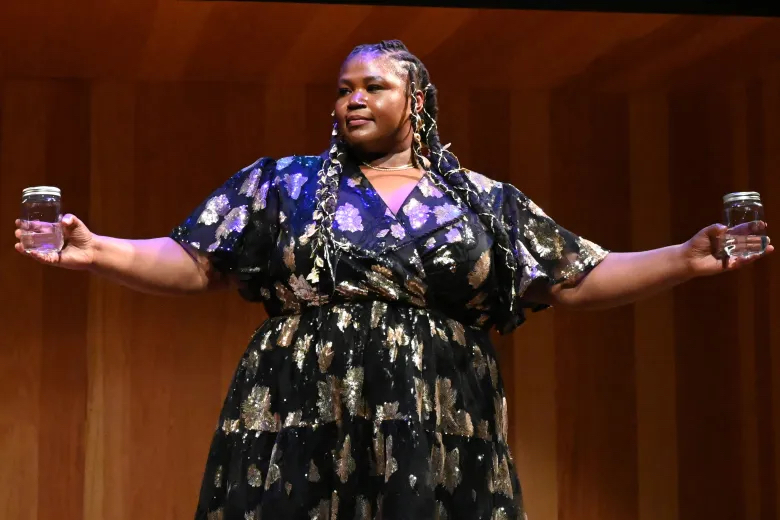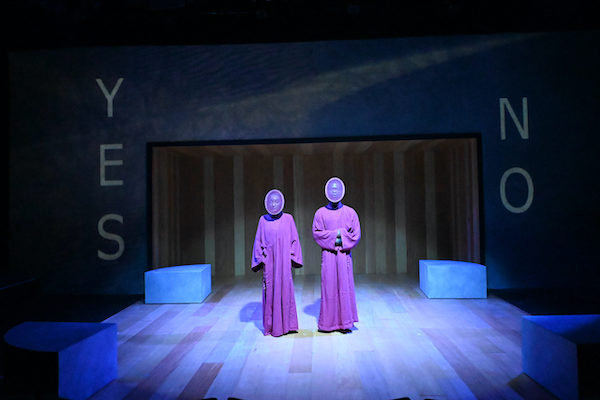
Messily we roll along.
That’s the feeling audience members will share as they endure the unfocused, overlong “Shipping & Handling,” a major misfire by Crowded Fire Theater which runs through September 7 on the Magic Theatre stage at Fort Mason.
Unless they walk out at intermission, which several spectators actually did on the opening night of this locally grown production, the sort of occasion that normally generates kumbaya-ish enthusiasm and obligatory standing ovations.
Written by Star Finch, whose deliciously ambitious “Josephine’s Feast” was a highlight of last year’s Magic season, and co-directed by Lisa Marie Rollins and Leigh Rondon-Davis, “Shipping & Handling,” like “Merrily We Roll Along,” features a meta-theatrical narrative told in reverse order.
It took more than four decades of ungainly productions for the storied Sondheim musical to find its feet, but “Shipping & Handling” will need a clean beheading and the amputation of its legs if it hopes to survive beyond this debut.
Spunky in the middle
The play’s relatively healthy heart is its central second act, essentially a solo performance art piece, ingeniously conceived by Finch and performed with both generosity and simmering reserves of rage by Rolanda Bell, who manages to remain compelling in her presence even when the script forces her to silently hold the stage through an epic, unnecessary longueur of silent audience participation.
Bell’s unnamed character is a playwright addressing the audience at a post-curtain presentation after the premiere of her show, which, she explains, wrestles with themes of blackness, feminism, spirituality and artificial intelligence.
The notion of a one act play in the form of a post-show talkback is brilliant, so long as it’s performed for theater-savvy audiences. These often squirm-inducing sessions of spectators’ self-aggrandizing bloviations disguised as earnest questions for the artist are ripe for satiric dramatization, especially in the case of plays about people of color performed for affluent white audiences.
Finch smartly has Bell’s Playwright explain that she’s wrested control of the talkback, dismissing a moderator, who would presumably aim to create a bridge of kid-gloved etiquette between the playwright and her inquisitors.
Inquisitors, as the Playwright makes clear, is the right word. By the time she conducts an experiment that involves passing a jar of water through the audience, she’s explained that these encounters often feel like waterboarding to a writer, asked to respond to questions as if she is a monolithic anthropomorphization of an entire race and gender, and as if a single play somehow offers a distillation of everything she possibly has to express.

More is less
Along with gleefully vivisecting the talkback form and lip-service liberal theater audiences, Finch slips in the seeds of potentially fascinating conversations that attendees might cultivate after leaving the show:
Is racial trauma epigenetically transmitted? Is AI developed by today’s ruling classes inherently doomed to replicate today’s prejudices? Do plays by Black authors achieve mainstream success only if written “in the tempo the liberal non-profit algorithm is looking for”?
Unfortunately, rather than leaving these intellectual threads to dangle, sizzling, in audience members’ minds as they leave the theater, Finch tries to weave them into something more cohesive, sandwiching her rewardingly exploratory second act between a first and third that end up adding little but running time.
There is some terrific sci-fi-evocative costuming by Brooke Jennings; sound design by Miles Lassi; and lighting design by Ray Oppenheimer in “Shipping & Handling”‘s third act, in which we see the play discussed in the Act II talkback. It tacks between redundancy and incoherence.
And the first act, an afterparty yak-fest among the actors who play the robots and their overlords in Act III is all throat-clearing; a loogie desperate to be hocked.
